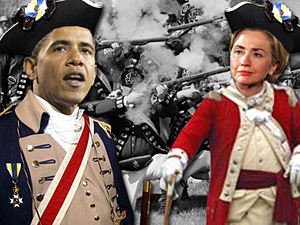
|
 |
 |
 Editorials | Issues | March 2008 Editorials | Issues | March 2008  
Will Clinton-Obama Fight Hurt Democrats?
 David Lightman - McClatchy Newspapers David Lightman - McClatchy Newspapers
go to original


| | Sens. Hillary Clinton, D-N.Y., and Barack Obama, D-Ill., are locked in a fierce, tight battle for the Democratic nomination and the rhetoric between them is only getting more intense. (ABC News) | | |
Washington — Let Hillary Clinton and Barack Obama rip each other apart. It's really no problem for the Democratic Party, veteran California Democratic strategist Bob Mulholland said.

"This is not a debate about ideology or war," he said. "This is about which one we Democrats love the most."

That's the line most Democratic activists are using these days as they watch the two presidential hopefuls engage in an increasingly bitter battle for the nomination, a war that, at least theoretically, threatens to open wounds that could be tough to heal.

"This could be a serious problem," said Shirley Anne Warshaw, a presidential scholar at Gettysburg College.

The past offers some worrisome lessons. In 1980, President Carter and Massachusetts Democratic Sen. Edward Kennedy fought up to and during the convention, and Carter never had the enthusiastic support of his party that fall. He lost.

Twelve years later, conservative commentator Pat Buchanan's supporters remained wary of President George H.W. Bush, and analysts think that a lot of them stayed home rather than vote for the man who'd broken his "read my lips, no new taxes" pledge. He lost, too.

Concerns are starting to grow that this year's Clinton-Obama contest could fracture the Democratic Party. African-American turnout has exploded, and Obama usually rolls up 8 or 9 to 1 ratios among black voters. He also does well among upper-income voters of all races.

But if he loses the nomination_ particularly if the decision turns on some insider maneuver such as last-minute superdelegate switches or a convention credentials committee ruling on disputed Florida and Michigan delegates — will they back Clinton in the fall?

And would Clinton backers, notably the older women who've routinely given her 2 to 1 majorities in primaries, come out for Obama?

Most experts give a qualified yes to both those questions.

"Everyone knows that winning the presidency is the ultimate goal," said Leo Lalonde, a veteran Michigan Democratic activist.

Warshaw said the key would be the loser's attitude. If that person quickly and eagerly embraces the winner, supporters should be quick to follow.

Being lukewarm or waiting, though, could be costly. In 1968, Democrats split bitterly and sometimes violently over the Vietnam War, and backers of antiwar candidates Eugene McCarthy and Robert F. Kennedy had a hard time forgiving Vice President Hubert Humphrey, the nominee, who lost in November.

McCarthy didn't formally endorse Humphrey until October. Humphrey, who was far behind in the polls, began a comeback as dissident Democrats grudgingly gave him support. But he fell short, losing the popular vote to Richard Nixon, 43.4 percent to 42.7 percent. Third-party candidate George Wallace claimed the rest.

But there's a big difference between 2008 and1968, argued David Barker, an associate professor of political science at the University of Pittsburgh.

Both candidates largely agree on how to tackle major issues, notably the Iraq war. As a result, "the odds will still be with a Democratic win," Barker said.

The problem for the eventual nominee could come down to the most basic of motivations: whether voters like the candidate enough to vote for him or her.

Ohio exit polls made it clear that many Obama supporters would be less than happy if Clinton wins, and vice versa.

"Is there going to be enthusiasm for Hillary Clinton in the black community? No," said David Bositis, a senior research associate at the Joint Center for Political and Economic Studies, which researches black voting trends. "Some African-Americans may very well sit on their hands this fall."

Even an impassioned effort by Bill Clinton, who won huge majorities among black voters when he ran for president, probably wouldn't work, Bositis said.

"He's somewhat tainted right now," Bositis explained, because of his comments in January, when he noted that Jesse Jackson had won South Carolina twice in the 1980s, suggesting that Obama's victory there was attributable to race.

Obama faces a similar dilemma among white women.

"We've waited a long time to be able to vote for a woman to be president," said Ellen Malcolm, the president of EMILY's List, which advocates putting Democratic women in office, and a Clinton backer.

Some analysts think that women who see Clinton as one of their own could be crushed if she's defeated. "A lot of women could take her defeat personally," Barker said.

"Democrats will vote, no matter who wins" the nomination, Malcolm said. "They're going to agree more with Obama on issues, but they (women) may take a look at McCain."

McCain has a history of drawing independent, better educated voters.

The consensus at the moment is that the Democratic Party is likely to heal fairly quickly. A lot of Democrats think that President Bush didn't really win the 2000 election and that a better campaign by nominee John Kerry in 2004 would have denied Bush a second term. This time they're hungry for victory above all.

"There just doesn't seem to be that fine a line between Clinton and Obama," said Si Sheppard, a professor of political science at Boston University.

Mulholland, an activist who's been to every Democratic convention since 1980, has witnessed a lot of intraparty strife, but he noted that it usually fades when things calm down and there's a common enemy.

He expects the same this time.

"Everyone will remember this fall," he said, "that this is our chance to win the White House." | 
 | |
 |



